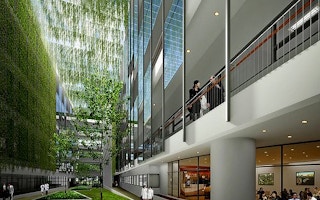Mid-sized enterprises, foreign and local alike, are sprouting in Singapore in the nascent but booming clean technology or “cleantech” industry.
Singapore’s Economic Development Board (EDB) now estimates that such small- and medium-sized enterprises (SMEs) will contribute as much as half of economic output from the cleantech sector by 2015. It expects the industry to add $3.4 billion to Singapore’s economic output and employ 18,000 people by then.
EDB’s director for clean-tech and urban solutions Goh Chee Kiong told The Straits Times in a recent interview that the cleantech industry “has significant opportunities for new enterprises due to the relatively fast pace of innovation”.
In the past year, the EDB has pumped $3.5 million into seven such cleantech firms – a mix of foreign and local – under a new “Quick Start” incentive scheme, said Mr Goh.
The scheme supports the commercialisation of cleantech innovations in early-stage companies, and comes with the condition that the firms locate their global headquarters and undertake technology-oriented activities in Singapore.
The incentive is capped at $500,000 each and is repayable upon the firm’s reaching certain benchmarks such as profitability and certain revenue levels within five years. If the company does not succeed, the investment will be written off.
Mr Goh said EDB is diversifying beyond attracting multi-nationals, to target global SMEs and Asian enterprises as this will “provide more ballast and vibrancy for the cleantech ecosystem”.
The incentive is complemented by a range of cleantech “incubators” such as NUS Enterprise, NTU Ventures, and Japan Asia Investment Company who can mentor these companies, he added.
Singapore has recently attracted some key cleantech investments, including global risk management firm DNV’s 100-strong clean technology centre at Science Park in Buona Vista and German conglomerate Bosch Group’s $92 million South-east Asian headquarters at Bishan.
EDB’s pursuit of global SMEs follows a recommendation by the high-level Economic Strategies Committee, which, in its report in February, said Singapore should lure not just MNCs, but “hidden champions” among smaller firms that excel in particular niches, as well as fast-growing Asian enterprises looking to expand outside their home country.
Industry association Singapore Business Federation (SBF) said it has seen a 30 per cent increase in the listings of companies in its sustainable business group, largely driven by the addition of local and foreign SMEs.
“We have seen more Singapore firms starting up or diversifying into the clean energy and environment sector, such as into solar manufacturing or green building and IT solutions,” said SBF’s spokesperson.
EDB’s Mr Goh believes that Singapore has a location advantage, and it lies in its ability to offer firms “a home which can see them through the innovation continuum” – from the research stages to commercialisation. Singapore can be a “living laboratory” for these firms, by adopting the companies’ new solutions and providing venues for test-bedding.
“Because we’re willing to take on the upfront risk on these new solutions, many SMEs are now coming here to set up homes for their businesses,” he observed. “We want to attract more of such firms.”
Singapore is currently building a home specifically for such firms: EDB and industrial landlord JTC Corp recently unveiled a 50 ha eco-business park next to Nanyang Technological University, which will be a centre for cleantech research, innovation and commercialisation.
It is expected to draw some $2.5 billion worth of investments in buildings by 2030 when it is fully completed.
The Housing and Development Board is also developing Punggol as Singapore’s first eco-town, which will offer cleantech firms a location for large-scale testbedding of new green technologies and urban solutions in areas like energy, waste and water management.
HDB is also involved in test-bedding solar techology for the tropical climate, and the Energy Market Authority is undertaking a pilot project for electric vehicles.
To further encourage the growth of SMEs in cleantech, SBF said Singapore could give more incentives for companies to adopt and deploy cleantech solutions, and broaden the development of testbeds regionally as well, such as in joint ventures in eco-city projects in China.
In the long term, Mr Goh said it is EDB’s vision “to grow these SMEs into larger, international companies over time”.

















